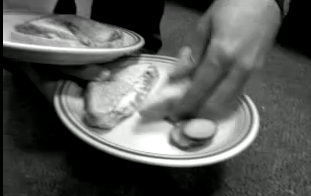“There’s an ick factor to almost all food."
That was my short-take on the pink slime smearfest, which has now dragged retailers, along with the U.S. Department of Agriculture, into the murky morass where public opinion intersects with scientific evidence.
 This is nothing new.
This is nothing new.
Me, I find E. coli and salmonella in raw sprouts icky.
Other people find ammonium hydroxide, or pink slime, icky. People may soon discover they find citric acid icky because that’s what Cargill uses to yield finely textured beef and reduce the pathogen load.
It’s pink, it’s meat, it’s lean finely textured beef – LFTB yo – versus pink slime in public opinion, and processors, retailers and government spokesthingies are acting like they’ve never encountered a food-related, or any risk-related issue where public opinion is different from scientific advice.
It’s theatre, like a Mike Daisey production.
Mike Hughlett of the Minneapolis Star Tribune writes today that Supervalu Inc., one of the nation’s largest grocery chains, will no longer sell hamburger containing an ammonia-treated beef filler dubbed "pink slime" by some food critics and a growing chorus of consumers.
The Eden Prairie-based company, which owns local supermarket leader Cub Foods, on Wednesday joined several fast-food chains and other major grocery operators in removing the controversial beef filler from hamburger sold in its outlets.
"This decision was due to ongoing customer concerns about these products," said Mike Siemienas, a Supervalu spokesman.
While ammonia-treated hamburger filler has gotten most of the popular attention, Supervalu also said its ban on so-called "finely textured beef" includes meat treated with citric acid, which is made by Minnetonka-based Cargill Inc.
California-based Safeway Inc., another national grocery chain, also Wednesday said it nixed sales of both ammonia-treated and citric acid-treated ground beef fillers. Cargill spokesman Mike Martin acknowledged .jpeg) that some of its grocery industry customers have eliminated finely textured beef.
that some of its grocery industry customers have eliminated finely textured beef.
"There have been customers who have contacted us because they have been contacted by consumers who are interested and concerned," Martin said.
Did Safeway and Supervalu stores get eggs from those nasty DeCoster farms in Iowa that sickened some 2,000 people with salmonella in 2010. Did they rely on crappy food safety audits to make their decision. If they are so concerned about consumer concerns, why won’t they provide information on egg suppliers? Or any other food?
Choice is a good thing. I’m all for restaurant inspection disclosure, providing information on genetically-engineered foods (we did it 12 years ago), knowing where food comes from and how it’s produced.
But I want to choose safe food. Who defines safety or GE or any other snappy dinner-table slogan drop? Removing pink slime hamburgers reduces my choice to buy microbiologically safe food.
USDA and the companies that previously outlawed pink slime acted expediently to manage a public-relations event. But they unwillingly undercut other efforts to provide safe, sustainable food.
What is USDA going to do about school lunch purchases containing genetically-engineered ingredients, hormones, antibiotics, and a whole slew of politically-loaded ingredients or production practices?
If consumers want to become food connoisseurs and safety experts, more power to them. I view my job, and the job of farmers, processors, distributors and retailers, regardless of political leanings, to make evidence-based information available and let people decide.
Market microbial food safety and hold producers and processors – conventional, organic or otherwise – to a standard of honesty. Be honest with consumers and disclose what’s in any food; if restaurant inspection results can be displayed on a placard via a QR code read by smartphones when someone goes out for a meal, why not at the grocery store? Or the school lunch? For any food, link to websites detailing how the food was produced, processed and safely handled, or whatever becomes the next theatrical production – or be held hostage.
.jpg)
, it’s good to poke fun at all things foodie. Satirical takedowns of the pretentious and pompous never go out of style, regardless of the medium.

 This is nothing new.
This is nothing new..jpeg) that some of its grocery industry customers have eliminated finely textured beef.
that some of its grocery industry customers have eliminated finely textured beef..jpg)
.jpeg) food at the Mandrake Road Church of Christ in Madison.
food at the Mandrake Road Church of Christ in Madison. to peanuts, shellfish and other foods in recent decades?
to peanuts, shellfish and other foods in recent decades? blockage.
blockage. and the kitchens were not shut down. It is believed that the illness was not food-related, a spokeswoman for NHS Highland said. The food packaging is the suspected source of the illnesses.
and the kitchens were not shut down. It is believed that the illness was not food-related, a spokeswoman for NHS Highland said. The food packaging is the suspected source of the illnesses. Food and Drug Administration said in an April 13 letter to the airline.
Food and Drug Administration said in an April 13 letter to the airline.  hankering for grilled cheese sandwiches. We found people were quick to warn our couple when they saw the disservice. But would anyone alert our couple if they became obnoxious and impolite?
hankering for grilled cheese sandwiches. We found people were quick to warn our couple when they saw the disservice. But would anyone alert our couple if they became obnoxious and impolite?